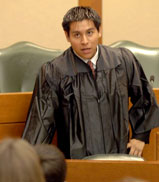
 Game InstructionsFrom Unit Plan: Justice by the PeopleTo access the simulation, click on the “Play Make Your Case” button to the right or direct students to www.scholastic.com/makeyourcase. Register: Players register individually or in teams as either the plaintiff (bicyclist) or the defendant (driver). One team can enter its decisions using the keyboard, the other using the mouse. Using the keyboard, players press the key that corresponds to their selection. Using the mouse, players click on their selection. Opening Statements: Following registration, the attorneys select evidence for their opening statements. Players receive feedback and earn points depending on how well they opened their cases. As the trial proceeds, students will continue to receive points for making good decisions on behalf of their client. The point totals for each side are displayed on screen throughout the game. These scores reflect the proficiency of the attorneys, not the merits of their respective cases. If you are playing this game in class with a jury, you may turn off the scoring display so the scores will not influence the jurors. Questioning: After opening statements, two witnesses for the plaintiff (the bicyclist and the police officer) and two for the defendant (the driver and the eyewitness) are questioned. Players select the questions they will ask. If players are uncertain of which question to ask, they may review the case file before deciding. The case file contains summaries of the witness’ depositions as well as a diagram of the accident, a police report, and a tip sheet titled “When Do I Object?” To return to the trial, students click on the eyeglasses that say “Trial” or press “T” on the keyboard. Objections: A player may object to an attorney’s question or a witness’ answer by clicking the objection button or typing “O” on the keyboard. Players may then replay the last question, check the case file, or choose what rule of evidence is at issue (relevance, speculation, or hearsay). The judge rules on all objections. If the objection is sustained, or accepted, the player earns 4 points. If it is overruled, or rejected, the player loses 1 point. During the first witness’ testimony, the game prompts players to consider taking action when an objection should be filed. Later on, players are left on their own to raise objections. View and print using Adobe Acrobat Reader® software, version 4.0 or higher. Get Adobe Reader® for free. |
Download the Make Your Case Trial Simulation here. Photos: © Digital Vision/Getty Images; © Rubberball Productions/Getty Images; © C Squared Studios/Photodisc/Getty Images; © George Doyle & Ciaran Griffin/Stockdisc/Getty Images; © Siede Preis/Photodisc/Getty Images; © David Toase/Photodisc/Getty Images; (2) © Bob Daemmrich/The Image Works; Bob Daemmrich/PhotoEdit, Inc.; © Bob Daemmrich/The Image Works. |



